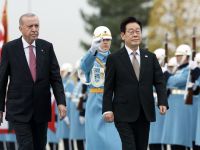Up to 56 percent of the American people strongly support expanding the military campaign against terrorism to include Iraq and "punish" President Saddam Hussein for his alleged ties to terrorism, reported the official Kuwaiti news agency (KUNA).
KUNA cited a poll conducted by Reuters news agency, which showed that 56 percent of the US public were supportive of the expansion of the current military campaign against terrorism to include strikes against targets in Iraq.
Eighteen percent of the American people said they supported these strikes in principle and only 22 percent were opposed.
Iraqi Deputy Prime Minister Tareq Aziz said Saturday that he expected an imminent strike on Iraq by the US and its allies.
Aziz said in an interview with a British newspaper Sunday that the United States and Britain planned to launch 1,000 missiles at 300 Iraqi targets in a bid to topple President Saddam Hussein, under the pretext of waging war against terrorism.
"We know that they are preparing for such an attack," he told The Sunday Telegraph.
"We know that it is just a matter of time."
He added: "When they decide to attack Iraq it will be for their own agenda because they want to replace this government, because it is independent and will not bow. It will not be because of what is happening in the US."
The United States and Britain have said they would keep close tabs on Iraq as they move ahead with their anti-terrorism campaign following the September 11 assault on New York and Washington, but have not identified the country as a target for military strikes, according to AFP.
US Secretary of State Colin Powell and British Foreign Secretary Jack Straw said Wednesday that Iraq could be a target if evidence was found linking it to specific acts of terrorism, but insisted their current campaign was focused solely on Afghanistan - accused of harboring Osama bin Laden, the prime suspect in the September 11 attacks.
But some current and former US officials argue that Iraq could have been involved in the assaults on the World Trade Center and Pentagon and the subsequent discovery in America of potentially deadly anthrax spores.
With those suspicions in mind, these officials have pressed for the military campaign on Afghanistan to be expanded to include Iraq, said the agency.
Aziz said any attack would be a "very grave mistake."
"The Arab world is not going to tolerate that at all because they know that this is unjust and is sheer aggression," he told the paper.
But he said it would not launch military retaliation.
"Political actions and stances will be taken by the Arabs which will add to the isolation of the United States."
He said he hoped Britain would make a "wise" and "calculated" judgement and not join the US in the attack.
"Up until now, what I am reading and hearing ... suggests that they do not want to, and I hope that their position will remain so."
The deputy prime minister said allegations that Iraq was behind the release of anthrax bacteria in the US were "baseless" and "ridiculous" - Albawaba.com







